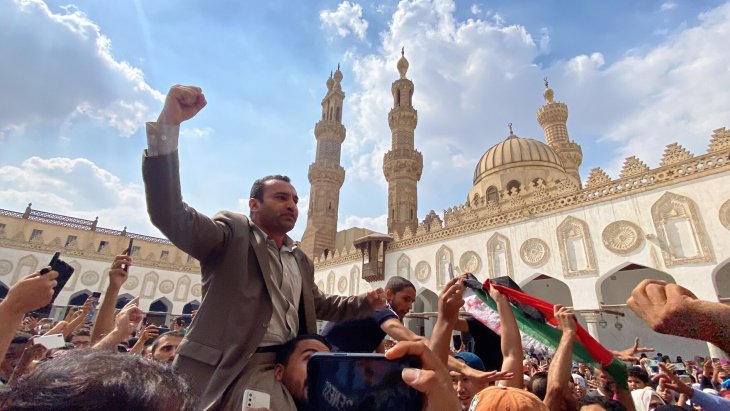Egypt plays a key role in the conflict between the Palestinians and Israel. Now the Egyptians are nervous.

Most Egyptians harbour a deep mistrust of Israel and support the Palestinians’ cause wholeheartedly. Cairo, Egypt on October 13, 2023. Photo: Mohamed Elshahed/Anadolu via Getty Images
With its almost 100 million inhabitants and its borders with both Gaza and Israel, Egypt plays a key role in the conflict between the Palestinians and Israel. Right now, the Egyptian regime finds itself in an awkward position.
Israel and Egypt have fought four wars since 1947: in 1948, 1956, 1967 and 1973. Most Egyptians harbour a deep mistrust of Israel and support the Palestinians’ cause wholeheartedly. Even so, Egypt is unwilling to open the Rafah border crossing, the Gaza Strip’s only gateway to the outside world, and the Egyptian president, Abd al-Fattah al-Sisi, does not appear an enthusiastic defender of the Palestinians.
How can we explain this apparent contradiction?
It is important to understand that there is a significant difference between the Egyptian regime on the one hand and ordinary Egyptians on the other. President al-Sisi and his allies in Egypt’s armed forces have created a brutal police state whose main objective is its own survival. How Egypt will act is primarily up to this regime. So let us examine three central factors that will determine to a large extent how the regime will act.
1 American support under pressure
First, Egypt has done very well from the peace agreement it entered into with Israel in 1978 (the Camp David Accords). As guarantor of Israel’s security, the United States undertook at that time to give Egypt annual financial support for so long as Egypt complied with the agreement. Since 1979, Egypt has received an average of USD 1.6 billion each year from the United States, mainly in the form of military aid. For this reason it is important for Egypt to show that it is a partner of the United States, or at the very least, not an enemy of Israel.
In recent years, the American support has come under increasing pressure due to the Sisi regime’s horrific treatment of its own citizens (for example, there are only two countries worldwide that imprison more journalists than Egypt). Every year, members of the US Congress demand that the president should reduce the financial support.
In addition, Egypt has lost much of its diplomatic status in recent years – Israel and the United States have been more preoccupied with countries such as Saudi Arabia and the United Arab Emirates. The Egyptian regime is now working hard to retain its privileged position as a middleman between the United States/Israel and the Palestinians. As a result, there is little scope for Egypt to provide the Palestinians with active support.
2 The border with Gaza: a headache
Second, the border with Gaza is a headache for al-Sisi. The Egyptians are nervous that Israel has secret plans quite simply to purge Gaza of the 2.3 million Palestinians who live there, and to try to have them settled in Egypt, on the Sinai peninsula. Recently, it has has emerged that Israeli documents do in fact exist that describe such an ethnic cleansing. One can only imagine what challenges this would pose for a poor, authoritarian country with approximately 100 million inhabitants. Egypt’s unwillingness to open the Rafah border crossing has much to do with this threat and the Egyptians are sufficiently nervous that al-Sisi recently repeated his absolute rejection of such a scenario in a telephone conversation with US President Joe Biden.
3 Al-Sisi hates Hamas
Third, al-Sisi and Israel share a common hatred of Hamas. Hamas is an Islamist organisation with strong ideological and historical links to the Muslim Brotherhood (formed in Egypt in 1928), which for decades has been the most important challenger to various Egyptian regimes. From the time al-Sisi came to power and up to the present, he has been attempting to crush the Muslim Brotherhood once and for all, including by a massacre in 2013 in which the army killed up to 1,000 civilian demonstrators. Accordingly, Egypt is obviously not prepared to give diplomatic or military support to Hamas, and Egypt wants to keep all Hamas activists out. If the border is opened, they are afraid that members of Hamas could sneak in.
Popular mobilisation
These three factors put Egypt in a fix: they watch the destruction in Gaza with horror, but they are eager to have Hamas weakened. In addition, they want to retain a good relationship with the United States – which in turn restricts how hostile they can be towards Israel.
But it is also important to remember this: apart from its hatred of Islamists, the Egyptian regime’s policies towards the Palestinians, Israel, and the United States are driven purely by its own interests.
Several factors could contribute to changing the regime’s political calculations. One would be a popular mobilization. Like most Arabs, ordinary Egyptians are indignant about the occupation of Palestinian territory, and emotions run higher each time Israel attacks the Palestinians. If public anger becomes strong enough to lead to demonstrations, they could pose a threat to the Egyptian regime’s control and stability.
Another factor is international politics. The day that China offers something to Egypt that is more attractive than the United States’ financial aid, the regime could see itself best served by switching friends on the international stage.
So far, the Egyptian regime no doubt sees the war in Gaza mostly as a threat to its own security and regional influence.
- Jacob Høigilt is a Professor of Arabic Language and Culture at the University of Oslo, and former PRIO researcher.
- This article was first published in Norwegian b Aftenposten 15 November 2023: “Tre faktorer setter Egypt i en klemme“.
- Translation from Norwegian: Fidotext